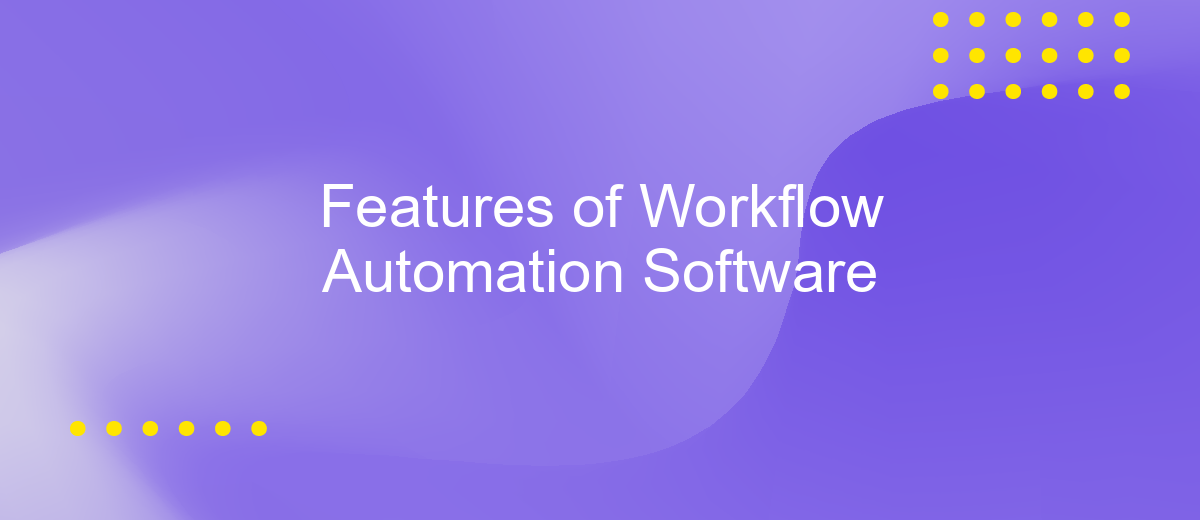Features of Workflow Automation Software
Workflow automation software has revolutionized the way businesses operate by streamlining processes and enhancing productivity. This technology automates repetitive tasks, reduces human error, and ensures consistency across various operations. In this article, we will explore the key features of workflow automation software, highlighting how these tools can optimize efficiency, improve collaboration, and drive business growth in today's competitive landscape.
Introduction
Workflow automation software has become an essential tool for businesses seeking to enhance efficiency and reduce manual tasks. By automating repetitive processes, companies can streamline operations and focus on more strategic activities. This software offers various features that cater to different business needs, making it a versatile solution for many industries.
- Task automation: Automates routine tasks to save time and reduce errors.
- Integration capabilities: Seamlessly connects with other software and services.
- Customizable workflows: Allows businesses to tailor processes to their specific needs.
- Real-time analytics: Provides insights into workflow performance and efficiency.
- Scalability: Grows with the business, accommodating increasing demands.
One notable service that aids in setting up integrations is ApiX-Drive. This platform simplifies the process of connecting various software applications, ensuring smooth data flow and enhanced productivity. By leveraging such tools, businesses can fully harness the benefits of workflow automation, driving growth and innovation.
Core Features

Workflow automation software provides a suite of core features designed to streamline and optimize business processes. One of the primary features is task automation, which allows repetitive tasks to be executed automatically based on predefined rules. This not only saves time but also reduces the risk of human error. Additionally, workflow automation tools often include customizable templates that can be tailored to specific business needs, enabling quick deployment and scalability. These templates facilitate the creation of workflows that can be easily modified as business requirements evolve.
Another essential feature is integration capabilities, which enable the software to connect seamlessly with other applications and services. For instance, ApiX-Drive is a powerful tool that simplifies the integration process by allowing users to link various applications without requiring extensive technical knowledge. This enhances the software's ability to automate data transfer and synchronization across different platforms, ensuring a cohesive and efficient workflow. Furthermore, real-time analytics and reporting features provide valuable insights into workflow performance, helping businesses identify bottlenecks and optimize processes for better efficiency and productivity.
Advanced Features

Advanced workflow automation software offers a range of sophisticated features designed to streamline business processes and enhance productivity. These tools are equipped with capabilities that go beyond basic task automation, providing users with comprehensive solutions for managing complex workflows.
- AI-Powered Automation: Leverage artificial intelligence to predict and automate repetitive tasks, reducing manual intervention.
- Customizable Workflows: Tailor workflows to specific business needs with drag-and-drop interfaces and flexible rule settings.
- Advanced Analytics: Gain insights with detailed analytics and reporting features to monitor performance and identify bottlenecks.
- Seamless Integrations: Utilize services like ApiX-Drive to connect various applications and systems effortlessly, ensuring smooth data flow across platforms.
- Security and Compliance: Ensure data protection with robust security measures and compliance with industry standards.
These advanced features empower organizations to optimize their operations, improve efficiency, and make data-driven decisions. By incorporating tools like ApiX-Drive, businesses can easily integrate disparate systems, enhancing collaboration and reducing the complexity of managing multiple applications. This makes workflow automation software an indispensable asset for modern enterprises.
Benefits of Workflow Automation

Workflow automation offers numerous advantages that significantly enhance business operations. By automating repetitive tasks, companies can save valuable time and reduce the likelihood of human error, leading to more efficient processes and improved productivity.
One of the key benefits of workflow automation is the ability to streamline complex workflows. This results in faster completion of tasks and projects, allowing employees to focus on more strategic activities that drive business growth. Additionally, workflow automation provides better visibility and control over processes, ensuring that all tasks are completed on time and according to predefined standards.
- Increased efficiency and productivity
- Reduced human error
- Enhanced visibility and control
- Streamlined complex workflows
- Cost savings
Integrating various applications and services is also simplified with workflow automation tools like ApiX-Drive. This platform enables seamless connections between different systems, ensuring data flows smoothly and tasks are automatically triggered across multiple applications. As a result, businesses can achieve greater operational efficiency and maintain a competitive edge in the market.
- Automate the work of an online store or landing
- Empower through integration
- Don't spend money on programmers and integrators
- Save time by automating routine tasks
Conclusion
In conclusion, workflow automation software plays a pivotal role in enhancing operational efficiency and productivity. By automating repetitive tasks and streamlining complex processes, organizations can focus on strategic initiatives and innovation. The integration capabilities of such software, like those offered by ApiX-Drive, further amplify its benefits by seamlessly connecting various applications and services, ensuring smooth data flow and reducing manual intervention.
As businesses continue to evolve, the demand for sophisticated workflow automation solutions will only increase. Investing in robust automation tools not only saves time and resources but also fosters a culture of continuous improvement and agility. With the right software in place, companies can achieve greater scalability and adaptability, positioning themselves for long-term success in an ever-changing market landscape.
FAQ
What is workflow automation software?
How can workflow automation software improve productivity?
Is workflow automation software difficult to implement?
Can workflow automation software integrate with existing tools and systems?
What are some common use cases for workflow automation software?
Apix-Drive is a universal tool that will quickly streamline any workflow, freeing you from routine and possible financial losses. Try ApiX-Drive in action and see how useful it is for you personally. In the meantime, when you are setting up connections between systems, think about where you are investing your free time, because now you will have much more of it.


